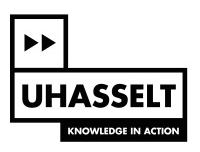Special Workshops and Tracks
Workshops can be proposed which fall within the scope of the conference.
Workshop proposals should be emailed to Philippe.Geril@eurosis.org, by indicating the type of workshop you would like to organize, before November 30, 2021. When preparing a workshop submission, please consider the link to the event and the specific nature of your proposal. A confirmation email will be sent to verify that the proposal was received.
See accepted workshops below
|
|
XR4Ped meets Ireland - Promoting Digital Higher Education by introducing Immersive Learning into Educational Studies
Abstract
Comprehensive progress has been made in the provision of digital learning solutions in recent years. Especially Virtual Reality (VR), Augmented Reality (AR) and the combination and further extension of both to Extended Reality (XR) have begun to enter the education markets. These technologies allow the simulation of almost any environment and process carried out in the physical world, whilst purchase costs have decreased enormously, the same way as the number of the so-called immersive learning apps has increased for all educational fields. But why do we see so few or nothing of them – and other e-learning solutions - in education?
Timing
The whole event will last at least half a day and will be attended by at least 20 participants and approx. 20 virtual participants. Prof. Eleni Mangina from School of Computer Science in UCD will lead in organising and implementing this dissemination event, both in the real and virtual environments. It will develop a detailed agenda containing contributions from external experts and stakeholders and will take care of all technical and organisational aspects. Although details of the agenda will be determined by real project developments as well as the needs and demands of the audience, the draft agenda could look as follows:
Timetable:
- 09.00 Registration (real and online)
- 09.30 Official welcome by Prof. Eleni Mangina and introduction to the set-up, structure and specific requirements for a hybrid event; short introduction of the project
- 10.00 Presentation of Intellectual Outputs 1 and 2 and their relevance to different stakeholders and target groups in Ireland
- 10.30 Break
- 11.00 Hybrid panel discussion with representatives from associated partners, stakeholders, policy makers and with experts in the field of immersive learning
- 12.00 Virtual session in the XR4Ped Lecture Theatre for networking, knowhow-exchange and presentation of best practice apps in immersive learning
- 14.00 End of event

University College Dublin (UCD) - XR4PeD
School of Computer Science
Dublin, Ireland
You can indicate your interest for the workshop
here or download the full info in pdf here .
.
FAnTASIA Workshop Fairy Tale Science Augmented
Abstract
FAnTASIA project aims at developing an educational package for the teaching of some basic scientific concepts & skills. It can be easily used by anyone regardless whether they are teachers, parents or guardians and regardless of their training. It can be used independently in class or at home, with the support of an adult. The educational material will be implemented in science classrooms as well as at homes and science centers, in participating EU countries and evaluated within specific educational objectives. Content will be delivered through the book and mobile application powered by Augmented Reality (AR) that helps to understand three science concepts for kids in K-12 grade.
The basic subjects which will be addressed are the concept of the shape of the earth; the concept of the sun, the phenomenon of the change of the day/night cycle; and the explanation of floating & sinking of solid objects in the water. Moreover the students will learn how to apply the scientific method in order to evaluate their beliefs concerning the above phenomena.
The Open Educational Resources of the project are available at the FAnTASIA Repository at https://fantasiadr.ucd.ie/ in three
languages: English, Greek and Italian.
More details about the project are available at https://fantasia.ucd.ie/.
Aims and Objectives of the Multiplier Event
The Workshop aims at presenting to the target audience and the wider public the intellectual outputs of the FAnTASIA project.
More specifically the objective of the workshop are to:
- present to target audience the intellectual outputs of the project,
- allow interaction between the participants and the FAnTASIA educational kit,
- get feedback by the participants on the FAnSTASIA educational kit.
CleverBooks will present to the target audience the most innovative educative product based on Augmented Reality technology and
traditional storytelling the FAnTASIA educational kit. The researcher of CleverBooks will demonstrate how the kit can be used at
school or at home by the teacher or the parent/guardian.
Participants will have the opportunity to implement activities of the proposed educational scenarios and will provide feedback
to the research group on their experience.

You can indicate your interest for the workshop
here or download the full info in pdf here .
.



Virtual Nuclear Simulator (ViNuS) in Education
Abstract
To train engineering students to operate safely in a nuclear or nuclear-medical environment, the faculty of Informatics (Expertise Centre for Digital Media) and the faculty of Industrial Engineering (NuTeC) are developing a Virtual Reality (VR) training environment within the ViNUS (Virtual Nuclear Simulator) IOP-project. In this VR-environment, the student will be confronted with the risks and consequences of decisions they make. This way they learn to take the decisions in a reasoned manner. The VR-environment forms a powerful tool to prepare for actions on nuclear sites or laboratory exercises and allows to form a bridge between the laboratory and industrial practices. With these VR modules international students can be prepared for nuclear sites or international training schools. The tool can also be used to confront high school students with the (medical) nuclear environment and safety culture in a safe and secure manner. Through a modular approach, we foresee the translation to other practices or target groups in the future.
Target Audience
If you think Virtual Reality would be a useful tool within your institution for training of (future) employees or if you are simply interested in the new VR technology, this workshop will be suited for you. It is a chance to experience a whole new virtual environment.
Workshop
The workshop will be given three times on the second day of the conference. We foresee 3 timeslots, each about an hour and a half. In each session there will be place for 10 participants. The workshop will start with a short theoretical introduction about the ViNuS project and its technical aspects. The second part will be a hands-on experience of the different modules developed with our VR-headsets. Within the ViNuS project, we have developed different scenarios aimed on the training of future professionals in the nuclear and medical-nuclear sector. These rather large scenario’s will be cut into several short modules, we will use a pass-through system in order to give each participant the chance to experience all the different modules.
Timetable June 2nd, 2022 (preliminary)
- 10.30 - 12.00 Workshop session I
- 12.00 - 13.30 Break
- 13.30 - 15.00 Workshop session II
- 15.00 - 15.30 Break
- 15.30 - 17.00 Workshop session III
Curricula Vitae
You can read the curriculum vitae of Wim Eerdekens here in pdf format  ,
and the curriculum of Jeroen Ceyssens here in pdf format
,
and the curriculum of Jeroen Ceyssens here in pdf format  .
.
You can indicate your interest for the workshop here.
Information Security, Privacy and Applications
This special track covers research in theory and applications of information security and privacy, and aims to attract the high quality papers in all technical aspects of information security. This special track seeks submissions from academia, industry, and government that present novel research on all theoretical and practical aspects of Information Security.
|
|
Submit your proposal for the Information Security, Privacy and Applications Workshop here

AREA42 Project meeting
We are involved with a new project in the field of B2B trade innovation which aims to start with pre-operational meetings from January 2020 onward and a first full organizational meeting
in June 2020 at our ISC conference.
At this point in time we are seeking interested simulation, modelling, AI, Data experts to attend and take part in these meetings which will focus on:
New simulation environments for trade risk assessments models.
For the last decades all trade related risks, should they be operational, financial, geopolitical were assessed based on documents certifying one representation of the reality at a
given moment plus when possible historical data to build probability, actuarial models. Nowadays technology allows us to leverage on a bigger variety of datasets (think social media,
supply chain, weather, payments etc) sometimes accessible instantaneously. Which simulation could you propose to build and test the next trade risk assessment and prediction model?
How could we test the impact of new sources of data on trade event.
Discrete Simulation Modelling Techniques and Tools & Simulation and AI
As far as simulation modelling techniques are concerned, it would be interesting to find graphical approaches to trade simulation modelling. A neutral, graphical, transparent representation of a
transaction would allow a better understanding and assessment of the trade risk. The system could automatically generate simulation programs based on trade parameters. Such projects would involve
Process Flow, Visual Modeling, Visualization and Animation, Business Process Modeling. Such a tool would benefit all trade parties. It would help financiers and insurers to have an exact representation
of the trade to offer the best solution. It will help traders/exporters/credit managers optimizing their trades and negotiate the solutions proposed.
AI and Neural Networks
Behavioural and neural analysis of trade decision makers, such as commodity traders or credit managers as a preliminary study to the build of a trade credit robo advisor - any technology mentioned can be used.
Agent-Based Simulation
Agent Based Simulation of payment behaviour in B2B commerce, an analysis per country, sector and level of digitization of the economy.
IoT & Industry 4.0
Due to the heterogeneity of these components and their interdependencies, it is urgent to find a simple way for fast IoT-generation that guarantees interoperability and reconfiguration. How could we
identify and request access to relevant IOT sensors to support the risk assessment in a trade context? What are the current blocking points?
How to assess and predict the environmental/biological/medical impact of a B2B trade? Which data / criteria should be taken into account to do so? How could we score and rank such impact for it to be taken into account in a procurement decision?
Other topics
Next to these specific ideations on modelling topics, some other ideas that we'd be interested to explore came to mind:
- Current and future effects of climate change on socio economical dynamics on a country level / Country risk analysis. Spatio temporal analysis.
- Current and future effects of climate change on corporate performance in different sectors.
- Is there value in diversity of credit risk models or can one credit risk model capture it all?
- Is there and can we quantify the influence of platformisation on payment behaviour? Hypothesis can be that Platformisation issues trust and will provoque different payment behaviour between customer and supplier. This would have a major influence on Credit insurance through platforms.
- Can we apply self explaining Machine learning (AI) algorithms to credit risk modelling? Credit risk models suffer from the fact that they need to be explained to the regulator. Most of the AI algorithms remain rather black box and do not deliver the reason for the model outcome. In order for AI to enter fully into the credit risk modelling it needs to be self explaining? Could we create such models and what are the data requirements (volume and kind) and how do they perform with respect to traditional models.
- Altman Z-Score in the age of real-time / open data marketplaces
- Homomorphic encryption and distributed AI
- Quantum risk modelling
Submit your interest for the AREA42 project here













